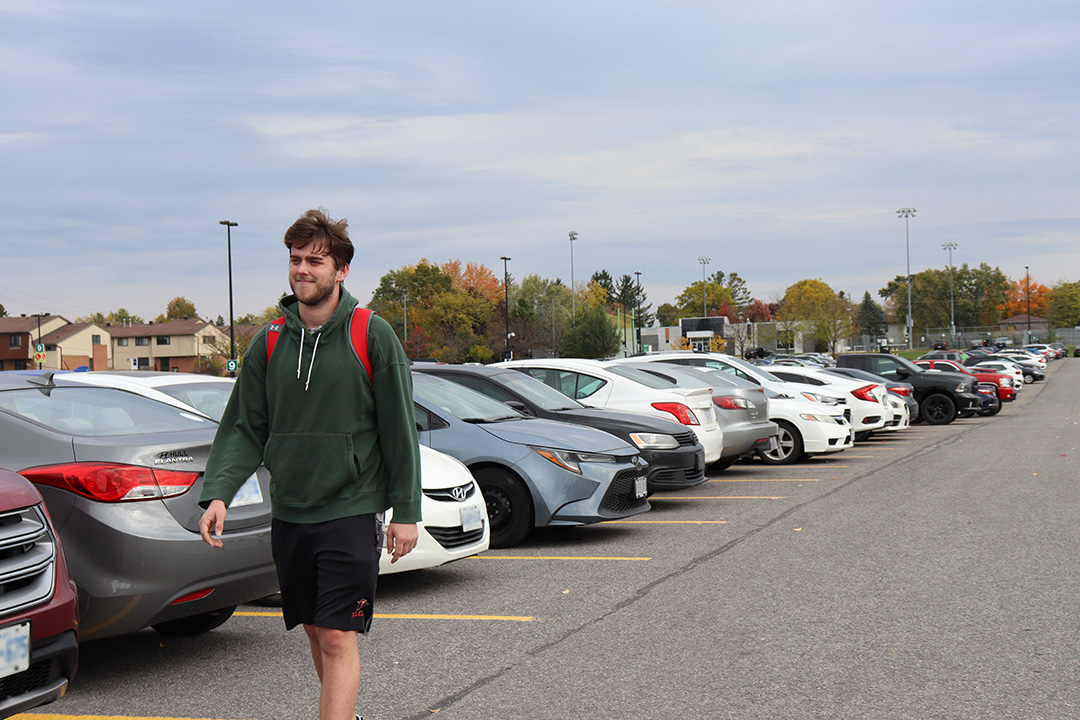Despite the financial burden students are facing to try and keep up with the steady pace of inflation, they must prepare for another blow as Algonquin College parking prices are set to rise another three per cent for the 2024-2025 academic year.
Parking rates at the Ottawa campus froze during the pandemic due to the lack of traffic coming through the school. However, the prices were raised by three per cent for the 2023-2024 academic term, the first time the prices had changed since 2019.
“This year, we decided to offset some of the costs that are coming our way,” said Roch Lafond, the parking services operation manager at Algonquin College.
Now, with the pandemic in the rear-view mirror, the prices are set to continue rising to match inflation.
“Everything has gone up,” said Lafond. “Food, transportation, all that good stuff, so the same applies for us. We have to pay for all the services that we hire.”
Students are already struggling to keep up with the current parking prices on campus, and frustration is running high.
“It’s pretty expensive,” said Alex Hobgod, 22, a law clerk student who bought a Lot 9 parking pass. “Especially since I think this parking lot (Lot 9) is $800 for the year which is a lot, and across the street (Lot 8) is over $1,000. It’s pretty ridiculous that 20 feet is $200.”
“Parking passes-wise, it’s kind of ridiculous that they make you book it before you get your OSAP,” said Victoria Halcrow, 23, a community and justice services student. “I couldn’t afford $800-$1,000 before I got my OSAP, but there are no buses that come to where I live.”
There is no financial aid or options for students who cannot afford the parking passes and annual parking passes must be paid in full before the beginning of September.
“It’s kind of unfair for them to make you pay the whole thing up front,” said Halcrow. “In my second year, I’m going to have placement for my second semester, so I’m not going to need a parking space realistically. I think they should have some spaces where they do a month-by-month basis.”
Some students had to change their methods of travelling to school to avoid the cost of parking, while others had to park off campus altogether.
“I know a couple of people that were driving and now because they can’t afford it they’re just using the bus,” said Hobgod. “But it’s two extra hours because they live far out of town.”
“I was very fortunate that one of my boyfriend’s friend’s roommate moved out, and he lives close to campus, so he’s letting me rent his parking space,” said Halcrow. “That’s on a month-to-month basis and it’s still a lot cheaper than if I got a parking pass.”
Students who commute to school with their own vehicle and live within the OC-Transpo area are unable to opt out of the school-provided U-pass, despite the lack of use.
“I think it’s kind of ridiculous,” said Hobgod. “If I’m going to pay for parking I shouldn’t have to pay for the bus.”
The parking fees are used to fund new programs, student infrastructure, college bills, employees and parking maintenance like snow removal and asphalt repair. However, there are some grievances regarding the quality of those services.
“I think they need to find a new company to do the snow removal for campus that actually does it properly,” said Meghan Kennedy, 20, an advertising and marketing communications management student who parks in Lot 9. “No snow removal company in their right mind does snow removal in the middle of the day when all the cars are parked there.”
During the winter months, early commuting students are forced to battle with unplowed lots, making it difficult to see the actual parking spaces.
“As someone who used to work in snow removal it’s an abomination,” said Kennedy. “It’s not how snow removal should be done and certainly not how it should be done for parking that costs that much.”
Since the pandemic, the number of students and staff making the daily commute to campus has increased exponentially. Both public transit and the parking lots are congested with daily users, and students cannot find sufficient space anywhere.
“The buses are already packed,” said Hobgod. “You want them on the campus and they’re full, so it’s not like that’s really helping because the parking lots are still full.”
Inflation is impacting everyone in Canada, and students have a lot of financial burdens resting on their shoulders. The added expense of parking on campus is weighing down heavily.
“With rent being so high and then on top of parking and tuition it’s just a lot,” said Hobgod. “It’s an extra expense that you don’t really need.”


